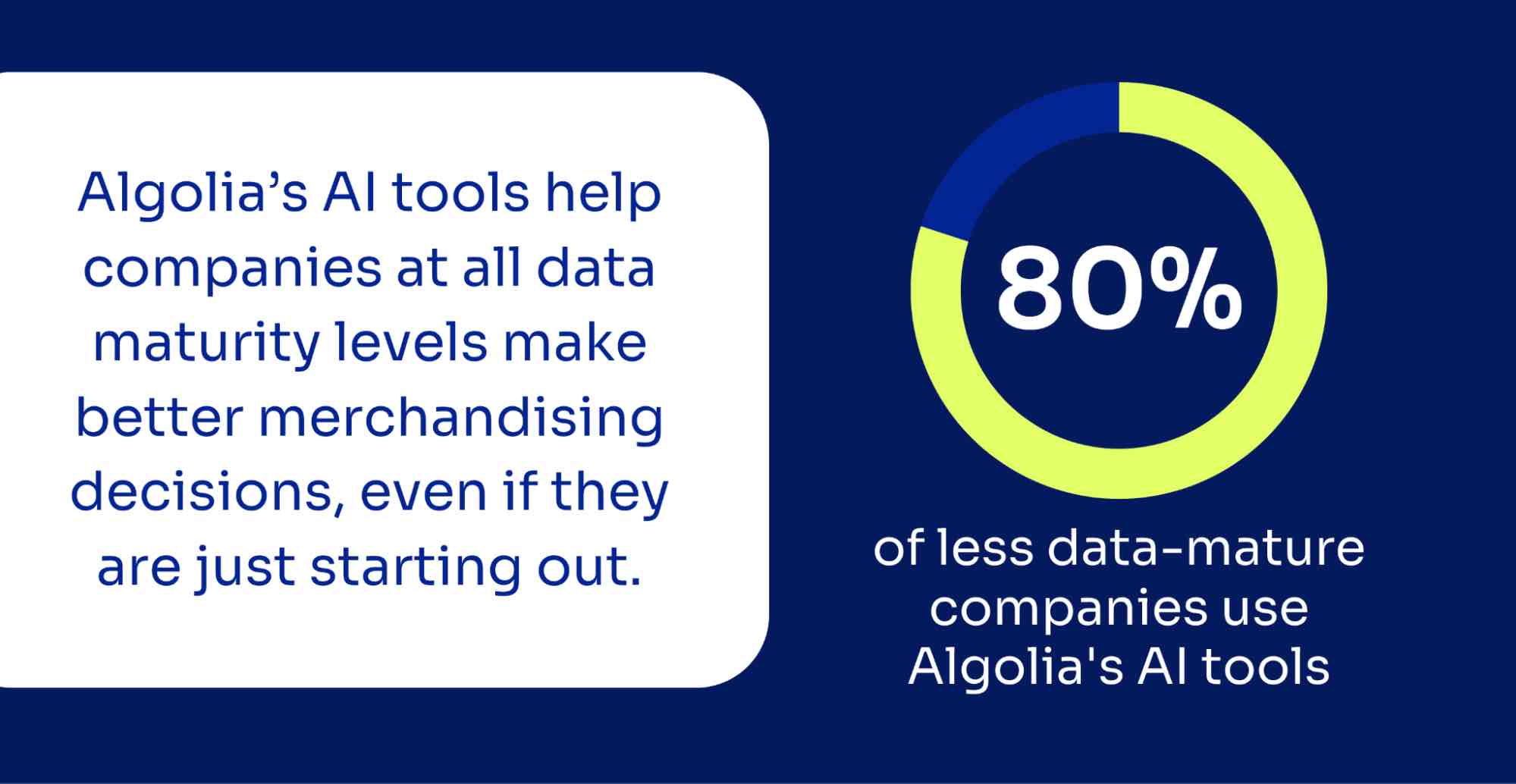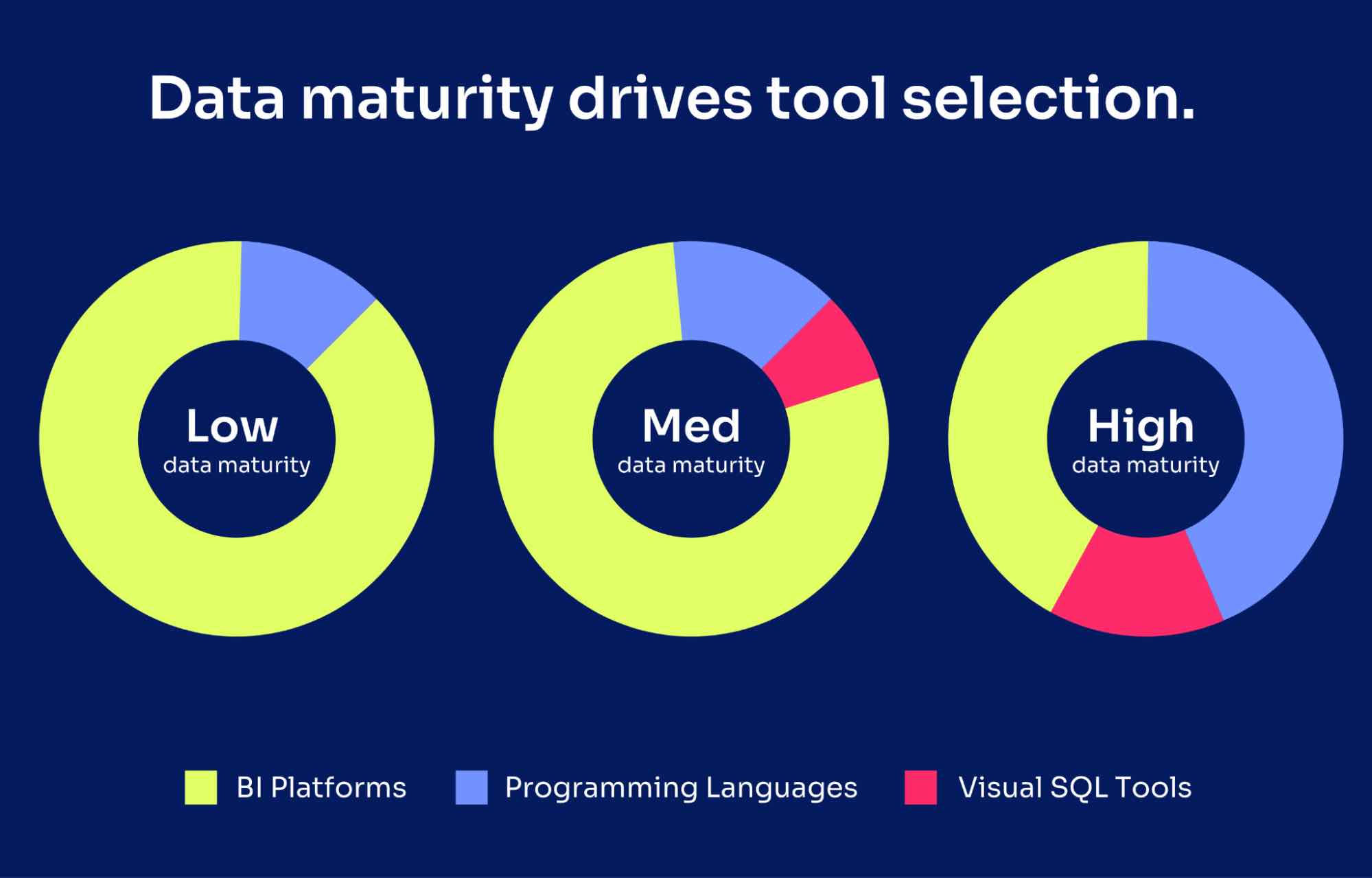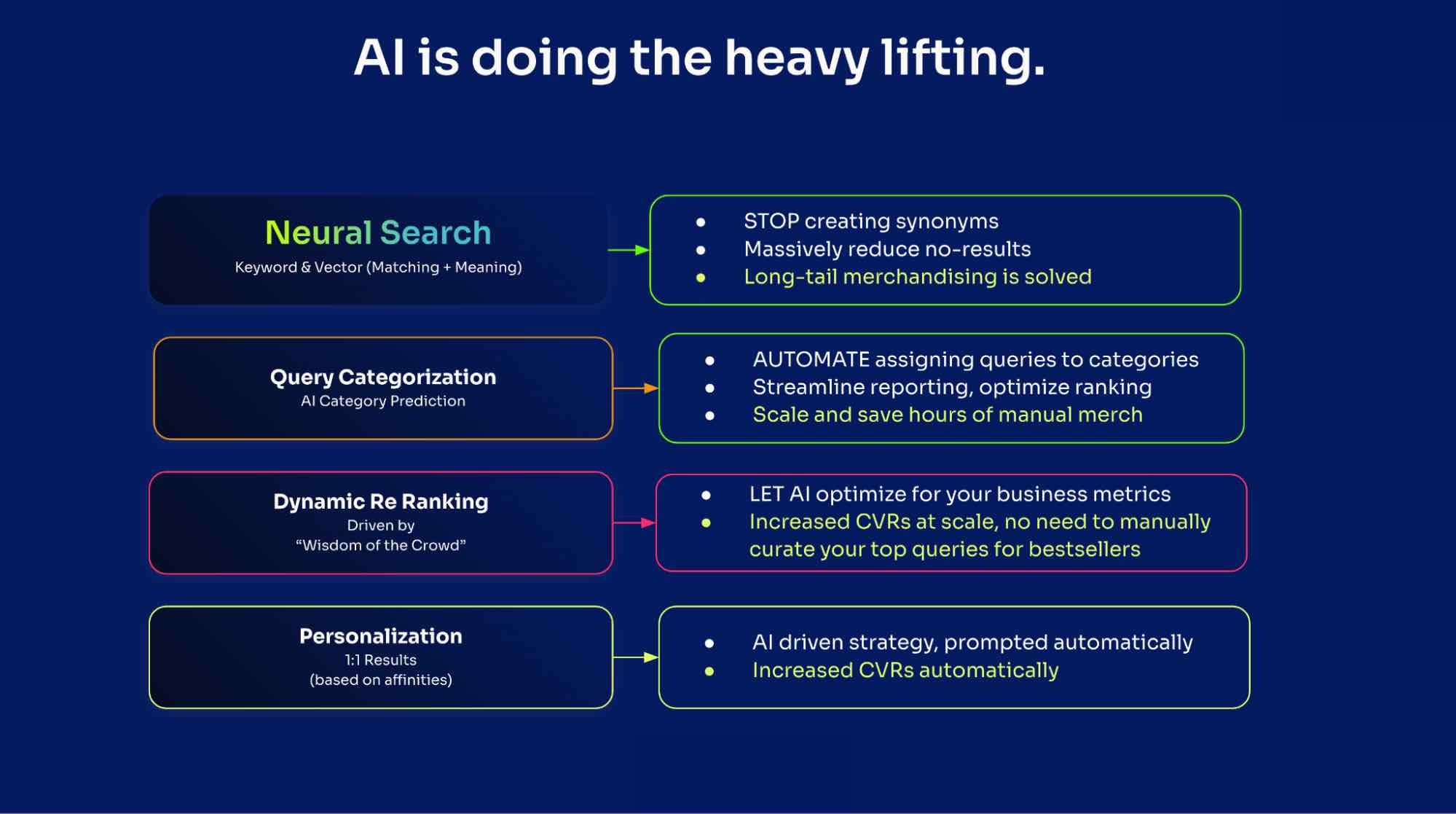Add InstantSearch and Autocomplete to your search experience in just 5 minutes
A good starting point for building a comprehensive search experience is a straightforward app template. When crafting your application’s ...
Senior Product Manager

A good starting point for building a comprehensive search experience is a straightforward app template. When crafting your application’s ...
Senior Product Manager

The inviting ecommerce website template that balances bright colors with plenty of white space. The stylized fonts for the headers ...
Search and Discovery writer

Imagine an online shopping experience designed to reflect your unique consumer needs and preferences — a digital world shaped completely around ...
Senior Digital Marketing Manager, SEO

Winter is here for those in the northern hemisphere, with thoughts drifting toward cozy blankets and mulled wine. But before ...
Sr. Developer Relations Engineer

What if there were a way to persuade shoppers who find your ecommerce site, ultimately making it to a product ...
Senior Digital Marketing Manager, SEO

This year a bunch of our engineers from our Sydney office attended GopherCon AU at University of Technology, Sydney, in ...
David Howden &
James Kozianski

Second only to personalization, conversational commerce has been a hot topic of conversation (pun intended) amongst retailers for the better ...
Principal, Klein4Retail

Algolia’s Recommend complements site search and discovery. As customers browse or search your site, dynamic recommendations encourage customers to ...
Frontend Engineer

Winter is coming, along with a bunch of houseguests. You want to replace your battered old sofa — after all, the ...
Search and Discovery writer

Search is a very complex problem Search is a complex problem that is hard to customize to a particular use ...
Co-founder & former CTO at Algolia

2%. That’s the average conversion rate for an online store. Unless you’re performing at Amazon’s promoted products ...
Senior Digital Marketing Manager, SEO

What’s a vector database? And how different is it than a regular-old traditional relational database? If you’re ...
Search and Discovery writer

How do you measure the success of a new feature? How do you test the impact? There are different ways ...
Senior Software Engineer

Algolia's advanced search capabilities pair seamlessly with iOS or Android Apps when using FlutterFlow. App development and search design ...
Sr. Developer Relations Engineer

In the midst of the Black Friday shopping frenzy, Algolia soared to new heights, setting new records and delivering an ...
Chief Executive Officer and Board Member at Algolia

When was your last online shopping trip, and how did it go? For consumers, it’s becoming arguably tougher to ...
Senior Digital Marketing Manager, SEO

Have you put your blood, sweat, and tears into perfecting your online store, only to see your conversion rates stuck ...
Senior Digital Marketing Manager, SEO

“Hello, how can I help you today?” This has to be the most tired, but nevertheless tried-and-true ...
Search and Discovery writer
In the fast-paced and dynamic realm of digital merchandising, being reactive to customer trends has been the norm. In the past, merchandisers would collect data after the fact and use it to inform decisions about what and how to sell. However, the digital landscape is constantly changing. Shoppers are becoming more demanding due to technology disruption and continuous innovation in digital merchandising platforms, according to McKinsey.
To meet this demand, merchandisers are now seeking ways to leverage AI tools to simplify their tasks and make better proactive decisions that can be automated. To stay ahead of the curve, merchandisers need to be able to predict customer preferences before they even know what they want. This is where AI tools can be a valuable asset. AI tools can help merchandisers to:
In this blog post, we’ll explore how our recent study on merchandiser data maturity sheds light on the transformative shift from reactive to proactive merchandising.
To understand how data maturity affects customer AI tool adoption, we recently surveyed 50 ecommerce customers involved in merchandising strategy from a mix of small, mid-market, and enterprise companies. The study revealed that a significant number of surveyed Algolia customers (76%) are already using mature data practices. These practices include consistent and informed data collection, cleaning, and analysis. We also found that data maturity is not determined by the size of a company; small and medium businesses can both be just as data mature as their larger counterparts.

Interestingly, we also found that less data-mature companies are using Algolia’s AI tools at a high rate. In our study, over 80% of less data-mature companies reported using Algolia’s AI tools, such as Dynamic Re-Ranking, Dynamic Synonym Suggestions, and Query Categorization. This demonstrates that Algolia’s AI tools can help companies at all data maturity levels make better merchandising decisions, even if they are just starting out.

Our research found that data maturity has a considerable impact on the platforms and experimentation strategies that companies use. Data-mature customers prefer off-the-shelf commerce platforms because they want to get up and running quickly and don’t always have the resources to build their own platforms. Even enterprise companies, who are more likely to build custom solutions, are showing a preference for off-the-shelf products.
Data maturity also influences the selection of data analysis tools. Data-mature organizations have the resources to hire data scientists and engineers who can use programming languages like R, Python, and SQL to analyze large datasets. Enterprise companies, on the other hand, prefer spreadsheets and BI platforms because they are easier to use and don’t require as much technical expertise.
The choice of platform and experimentation strategy should be aligned with the company’s data maturity level. By choosing the right tools and strategies, companies can make better decisions and drive business growth.

Here are some additional insights from other research studies we’ve conducted:
AI tools can help merchandisers make better decisions by providing insights into customer behavior and trends. Our research consistently shows that merchandisers on all search platforms often struggle to accurately measure the impact of their strategies across the wide range of tools they use. However, Algolia’s data mature customers exhibit an interesting contrast: while they excel in measuring the success of their merchandising efforts, they express less confidence in their ability to make data-driven decisions. AI tools can help businesses do both: track the success of their merchandising efforts and identify areas for improvement in decision-making.
Algolia’s AI-powered tools seamlessly combine multiple AI signals to optimize business metrics, helping merchandisers understand customer intent, optimize product catalogs, and deliver personalized experiences that lead to increased sales and improved customer experience. For example, Algolia’s Query Categorization tool automatically groups user queries into product categories without coding, helping merchandisers understand customer intent and reduce catalog maintenance. It also includes analytics that automate reporting by forming clusters from category-related search queries, giving merchandisers deeper insights to improve product performance.
Algolia’s Query Categorization helps merchandisers do both: leverage category predictions to improve data-driven decision-making and track the success of their category merchandising efforts through analytics and automated reporting.

Here are some tips for using AI tools to track merchandising success:
By following these tips, you can use AI tools to track merchandising success and make better decisions about how to allocate your resources. This can help you to improve your business performance and stay ahead of the competition.
In the ever-shifting world of merchandising, data plays a pivotal role in guiding your path ahead. Whether you opt for cutting-edge AI tools or stick to more traditional data analysis methods, one unwavering principle stands tall: the vital importance of integrating insights into your strategy. This integration automates the continuous improvement of AI models, making your merchandising efforts more agile and responsive, saving you time and money so you can focus on more strategic tasks.
By embracing AI tools and fostering mature data practices, merchandisers gain the ability to make more strategic decisions, accurately predict customer preferences, and ultimately drive business growth.
Powered by Algolia Recommend